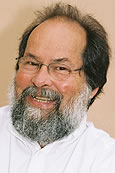
Today’s extract is again from chapter 5 of Frequently Avoided Questions – an uncensored dialogue on faith, by Chuck Smith Jr and Matt Whitlock. The book was published by BakerBooks, 2005 – 252 pp – $29.95
Mike Yaconelli died too soon. For more than thirty years I have known of his ministry, yet I was unprepared for the gentle wisdom and reassurance I found in his book Messy Spirituality, released the year before he died. His book hit a nerve with new-school believers (a quick search on the Internet for blog sites where his book is discussed will reveal not only its popularity but the strong resopnse of young people who fully identify with its theme.) We love Mike’s book because he describes Christian faith in a way that is true to our experience.
In Messy Spirituality, Yaconelli tells stories about himself, others, and his church that sound familiar. People who love God, yet sin; people who take two steps forward in Christ, then slide three steps backward; people who swear, yet demonstrate incredible generosity. Messy Spirituality is unstructured, unpredictable, unstable, like the real life most people know. The Christian experience Yaconelli talks about is transparent regarding its struggles, honest its failures, carried forward by God’s infinite grace, and totally impossible to manage.
I also love Rick Warren’s book The Purpose-Driven Life and have a deep respect for Rick as a Christian leader and trainer. However, I agree with Justin Baeder who on his blog said, ‘I really think its message is pretty good; it’s just that the packaging is not well-suited to the emerging generations…This book was written to get Boomer churchgoers to do more than warm pews; it’s not an evangelistic tract for 20-somethings.’ Here is the difference between old school and new school in regard to spiritual growth. Old school continually simplifies the process, breaking it down into stages, whereas new school sees the process as a complex whole, beyond sorting. Yes, some things you can control, but the demand for continual grace (on God’s part) and faith (on ours) is extremely high.




